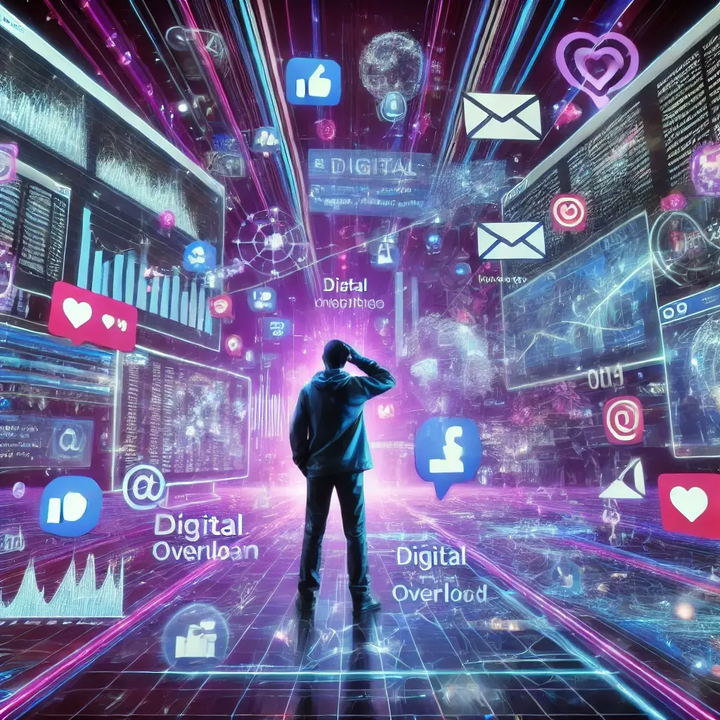
Ever feel like your brain is going to explode? Like you've just finished an intense scroll on Twitter, hopped into a few meetings, and now your head is buzzing with random facts, ideas, and to-dos? Yeah, that's information overload, and we're all drowning in it.
Welcome to the digital age—where information is infinite, and our brains… well, they're not.
Let's talk about how to deal with it.
The Problem: You Can't Handle It All (And That's Okay)
Here's the deal: our brains are wired to handle a limited amount of information. Back in the day, we were good at keeping track of where to hunt, who's in our tribe, and where to find the best berries. Fast forward to 2024, and now we're trying to juggle Slack messages, email threads, TikTok trends, news alerts, and whatever Elon Musk just tweeted.
It's not just a lot—it's too much.
Information overload isn't just annoying; it's a productivity killer. You're trying to work on something important, but your brain keeps nudging you about that random article you read this morning or the 17 open tabs you've promised yourself you'll get to. Spoiler: you won't.
So, what can you do?
Step 1: The Digital Detox (Not What You Think)
I know what you're thinking—"Digital detox? You mean I should throw my phone in the ocean and meditate for a month?"
Nah. We're not doing that.
Instead, think of a digital detox as a reorganization of your digital life. Start by asking yourself: What's actually worth your attention? Which information sources add value, and which ones are just noise?
Here's a tip: Mute or unfollow accounts that don't bring you joy or value. Set up filters in your email so that only the important stuff hits your inbox. And for the love of productivity, stop scrolling endlessly. You don't need to read every tweet or article out there.
Step 2: Build a Second Brain
What if I told you that you don't have to remember everything?
This is where the concept of a "second brain" comes in—a digital system that helps you organize, store, and recall the information that matters. The idea isn't new, but in today's world, it's a game-changer.
Imagine this: Every time you come across something valuable—a great quote, a new framework, an idea for your next side hustle—you store it in your second brain. Tools like Notion, Roam Research, or even a good old-fashioned notes app can do the trick.
But here's the kicker—having a second brain isn't just about storing information. It's about retrieving it when you need it. And that's where searchability comes into play.
Step 3: Make It Searchable
You've heard the phrase "Google it." Now, apply that to your own knowledge base.
The beauty of building a second brain is that you can turn your chaotic digital life into a well-organized, searchable database. When you need something—boom—you just search for it. No more scrolling through endless notes or bookmarks.
Enter SecondBrain AI (yes, shameless plug, but trust me, this is worth it). It's a tool designed to be your personal Google, where you can import all your saved content from LinkedIn, Twitter, and wherever else you stash your good stuff. Then, when you need to find that gem of an idea, just type in a few keywords, and it's there.
Imagine how much mental space you'd free up if you didn't have to remember everything. That's what managing information overload is all about.
Step 4: Be Ruthless With Your Time
Ever heard of the 80/20 rule? It states that 80% of your results come from 20% of your efforts. Apply that to information consumption.
Spend 80% of your time on the 20% of information that actually matters. Be ruthless about what you let into your brain. If it's not going to move the needle for you—whether in business, personal growth, or just life in general—skip it.
Instead, focus on deep work. Schedule time to dive into the stuff that truly matters without distractions. Turn off notifications, close those extra tabs, and go deep. Trust me, your brain will thank you.
Step 5: Embrace the Chaos (But Control It)
Finally, let's get real. You're never going to completely eliminate information overload. It's the price we pay for living in a hyper-connected world. But you can control it. By being intentional about what you consume, building a system to store and retrieve information, and focusing your time on what matters, you can turn the chaos into something manageable.
So, take a deep breath, and start building your second brain. Your future self—the one who's not overwhelmed by the endless flow of information—will thank you.
P.S. If you want to start taking control of your digital life join the waitlist for SecondBrain AI. It's time to turn that information overload into a superpower.

Managing Information Overload in the Digital Age